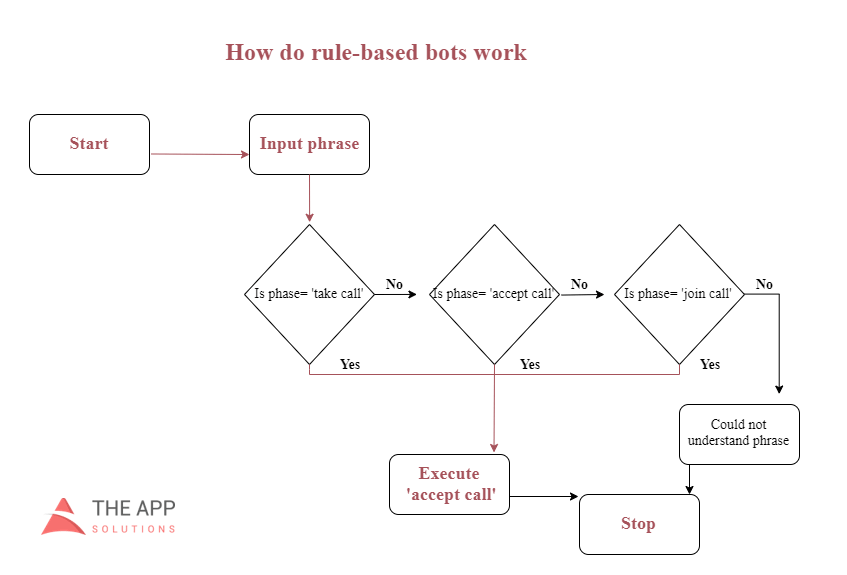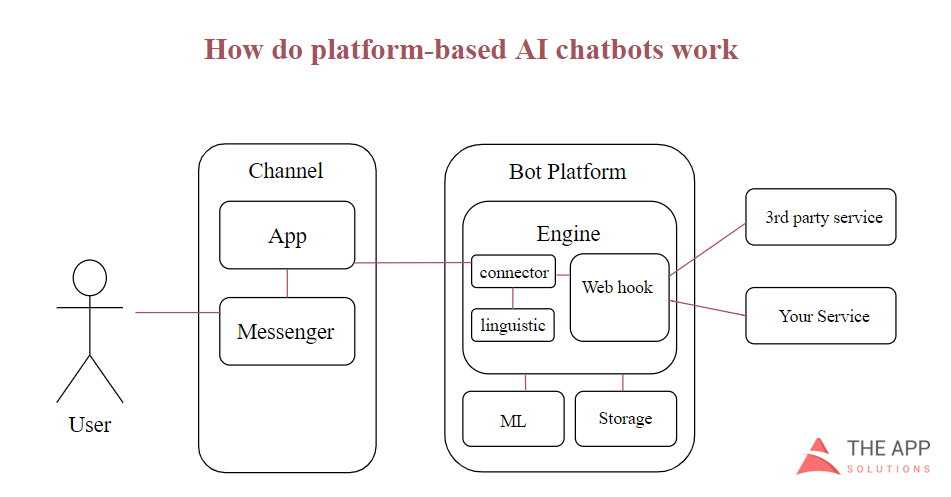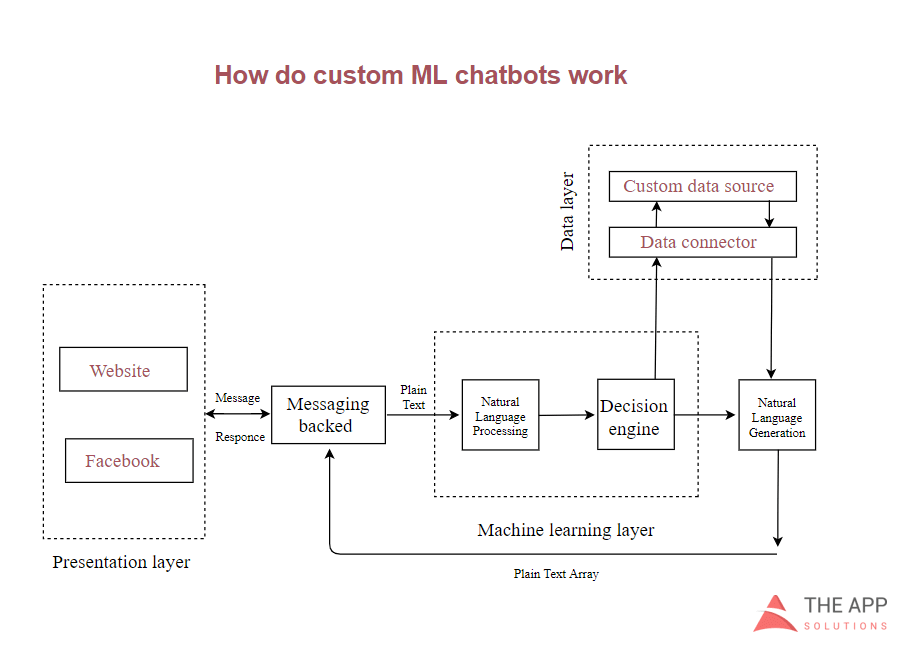- Benefits of chatbots for Real estate
- Types of chatbots for real estate
- Scripted bots
- Platform-based AI chatbots
- Custom NLP and AI chatbots
- How to develop a real estate chatbot
- Step 1. Define your Business Needs
- Step 2. Evaluate Budget
- Step 3. Consider integrations
- Step 4. Develop MVP
- Step 5. Launch MVP
- Step 6. Second development stage
- In a nutshell
Real estate is one of those industries where communication plays an essential role. However, not all people who contact real estate agencies are qualified leads that will buy a flat. Thus, many real estate brokers waste their time answering the same questions from people who would never return to sign a contract.
This is where chatbots come in handy. By using real estate chatbots, agencies can not only qualify leads and send follow-ups, but also improve engagement and increase sales.
In this article, we will tell you about chatbots for the real estate segment and how you can build one that will perfectly suit your business strategy.
But first, let’s find out what benefits chatbots bring to real estate businesses.
Benefits of chatbots for Real estate
When selling real estate, agencies, and real estate agents receive many queries from prospective customers who want to know more about the development. In a perfect world, a real estate agent gets in touch with potential buyers and handles the one-on-one conversation which results in buying a house or a flat. But in the real world, the selling process appears not as simple as it seems. Often people, who received detailed information from a real estate broker, disappear, or the real estate agent could not physically handle all queries from potential clients. To get deeper insights into the Real Estate segment, we asked Nadiia Pavlik, a Real Estate broker from Keller Williams Chicago – Lincoln Park, to share her experience in communicating with clients.

Chatbots might bring the following benefits to real estate businesses:
- Immediate responses. A chatbot can answer the client’s queries immediately via a website, messenger, or social media, like Facebook. While Chatbots save up to 30% in customer support costs, clients do not have to wait for answers from a human agent about their interest in a property.

- Availability 24/7. Unlike real estate agents, who might not be available throughout the day, chatbots provide your customers with information outside of working hours. Besides, chatbots can help you to save on customer service costs by speeding up response times and answering up to 80% of routine questions.
- Personalized offers. All customers are looking for different types of apartments and property types. Chatbots provide customers with a series of questions to come up with more relevant offers, which is more effective than collecting information via physical copies or forms.
- Improved leads qualifying. Chatbots can qualify your potential leads by comparing their behavior with the behavior of the previous clients and assigning them scores of lead maternity. In this way, your real estate brokers can communicate with only highly-qualified leads.
- Automated scheduling. When the chatbot qualifies the lead as a potential buyer, one can schedule a home tour via chatbot. Besides, bots can introduce the client to a real estate agent for more detailed communication.
- Effective follow-ups. You can enable your chatbot to send automated follow-ups to potential customers via the medium they choose, including email, social media, messengers, or even SMS.

Now that you are aware of chatbot benefits for real estate, let’s find out what type of chatbot will meet your business goals.
Types of chatbots for real estate
Chatbots vary depending on use cases and complexity. Currently, there are three types of chatbots:
Scripted bots
Scripted, or rule-based is the simplest type of chatbot. They have strict logic to search commands in the input text. Such bots are programmed to answer simple questions or perform simple actions. You can use them as online assistants for answering the FAQ section or collecting customers’ personal information.
You can create this type of bot without help from bot developers using the following DIY bot-builder platforms:
- Chatfuel
- Flow
- MobileMonkey
- ManyChat
By using these platforms you can develop a simple bot for your website, messengers, or social media such as Facebook. At the same time, consider that bot-building platforms do not provide a lot of room for customization of a chatbot interface.

But if you are looking for a solution to optimize business processes, you can choose between the next two types of chatbots.
Platform-based AI chatbots
This type of bot uses more sophisticated data processing technologies, such as Natural Language processing to process user input and provide relevant not-prescripted answers. You can build such a bot for providing users with relevant results from your real estate catalog and lead qualification.
You can build an AI-chatbot using a ready-made platform, such as:
- IBM Watson Assistant
- Semantic Machine
Or even machine learning bots with cognitive abilities using:
- Microsoft Azure
- Wit.ai Chatbot Platform
- Dialog Flow platform
Most of these platforms support integration with websites and most popular messengers such as Whatsapp, Facebook Messenger, and Telegram.
If you want to develop such a bot, you may need help from chatbot developers for initial bot settings and training.

Platform-based AI-chatbots are the best option if you have a small business and do not need custom functionality. But if you do, consider the next type of chatbots.
Custom NLP and AI chatbots
Such chatbots are custom applications created by developers. You can apply AI bots for solving particular complicated business issues, such as providing customers with personalized flat recommendations, scheduling an appointment with a real estate agent, saving communication with a customer in ERP for relevant recommendations, and so on.
The most popular programming languages for developing custom chatbots are:
- C++
- Java
- Python
Developing custom chatbots is the most time and money consuming option. Still, it is quite popular among big companies and enterprises, since custom code gives you the possibility to empower the chatbot with any feature, type of customization and integration to meet your business needs.

Once you have decided on the type and complexity of your chatbot, you can start developing one using the step-by-step guide below.
How to develop a real estate chatbot
To integrate a chatbot to your real estate business you need to go through the following steps:
Step 1. Define your Business Needs
During this step, you should find out the issues you want to solve with the help of a chatbot, what exact features your chatbot should perform, and how complex it should be. For instance:
- Receive more qualified leads
- Improve customer engagement
- Automate lead generation and validation
- Or all at once.
Step 2. Evaluate Budget
Now, consider how much you want to invest in your chatbot. You may have a considerable or limited budget or no budget at all. Let’s see what solution may suit your budget.
Tight budget
With a tight budget, you cannot build a custom solution with numerous integrations. Instead, you can create a script-based one-task online assistant. Thus, you can choose among bot builders previously discussed in this article. Such DIY chatbot platforms are user-friendly, have a drag-and-drop menu, and have low charges for publishing a bot.
| DIY chatbot platform fees | |
| Chatfuel |
|
| Flow XO |
|
| MobileMonkey |
|
| ManyChat |
|
Budget for a full-scale project
If you have enough budget to build a feature-rich bot with third-party integrations, consider developing a platform-based or custom AI chatbot. In both cases you will need help from a chatbot development team, since complex platforms, and custom code in particular, requires specialists with considerable expertise. Hiring chatbot developers for your real estate agency has numerous advantages. The team would be responsible for initial chatbot setting and training, testing and further technical maintenance.
| AI-chatbot building platforms fees | |
| IBM Watson Assistant |
|
| Semantic Machine | On request |
| Machine learning bot-building platforms fees | |
| Microsoft Azure | On request |
| Wit.ai | Free |
| Dialog Flow |
|
Step 3. Consider integrations
Now, you should decide how many integrations your bot will have. In most cases, developers perform all the chatbot’s integrations. For example, for a simple Facebook Messenger bot, you will need a developer who will integrate it with your Content Management System (CMS). You can also connect your chatbot with your Customer Relationship Management (CRM) and other third-party software, as email marketing tools, databases, and others. Below, we have gathered a list of the most popular and useful integrations for a real estate messenger bot:
| SharePoint & Office 365 | Suitable for handling document search and event management. |
| Open Authorization for SharePoint | Suitable for document storage, management, authentication, and many other administrative tasks. |
| CRM Applications | For providing better customer support, you can integrate your bot with Salesforce CRM, Zendesk or LivePerson. |
| Enterprise Content Management | This integration is handy to allow your real estate agents, customers, and managers to find relevant documents quickly |
| ERP Systems | With a chatbot, you can add more functionality to you ERP systems for overall management without the need of a backend database or dashboards. |
Step 4. Develop MVP
While you can build an MVP with DIY platforms within a few hours, developing a sophisticated bot requires more time and effort from both you and bot developers.
We recommend launching complicated chatbot projects as MVP. This approach allows testing a chatbot without spending a considerable amount of money.
For developing an MVP of the Facebook Messenger chatbot, consider the features in the table below. To give you an idea of how much time the development stage will take, we have also added estimation in hours.
| FeatureScreen | Functions required | BackEnd |
| Architecture | 12+ hours | |
| Customization for agents |
| 60+ hours |
| Connection to Data Server API | 16+ hours | |
| Switching between a chatbot and human agent |
| 32+ hours |
| Gathering of data from user |
| 32+ hours |
| API integration |
| 16+ hours |
| Offers |
| 8+ hours |
| Show more variants | 16+ hours | |
| Admin Login | 8+ hours | |
| Chatbot Management |
| 40+ hours |
| Total | From 240 hours |
So, how much does a real estate messenger bot cost? The cost to develop a Messenger chatbot MVP for a real estate business varies from $4,000 to $8,000 and depends on the project’s complexity and the number of integrations.
Step 5. Launch MVP
After the release of a real estate chatbot MVP, ask your real customers to test it and pay attention to the following elements:
- User Experience (UX)
- Bots Flow
- Speed of Response
- Answers’ Accuracy
- Fallbacks
- Engagement
After conducting the beta testing of your chatbot and gathering feedback, you will have a clear idea about what you can improve in your chatbot and what features to add.
Step 6. Second development stage
At this stage, you and your development team need to enrich the chatbot with additional features and fix the bot’s trouble areas. You should also continue analyzing the bot’s interactions with real users and track how well your bot is working by connecting it with analytics.
However, you should not forget about the maintenance and technical support of your bot. For this task, we recommend hiring chatbot developers who will monitor the bot’s performance, at least during the initial post-launch period, and fix bugs on the fly.
Want to Learn More About The APP Solutions Approaches In Project Development?
Download Free EbookIn a nutshell
Real estate is one of those industries that’s evolving thanks to chatbots. You should consider developing messenger bots for your real estate business if you want to reduce customer support costs, receive more qualified leads and, as a result, increase your income.
The complexity of your bot should be based on your business needs.
- Consider developing a scripted bot if your business needs a bot that will be available 24/7 to answer simple user questions.
- Choose between platform-based or custom AI chatbots if you want your bot to perform more complex tasks, such as lead validation, follow-ups, and personalized recommendations.
Related articles:
HOW CHATBOT CAN MAKE AN EFFICIENT PATIENT SUPPORT SYSTEM
